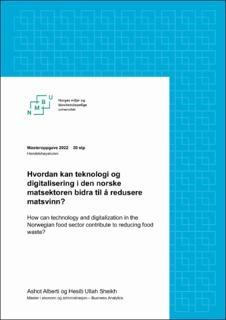| dc.contributor.advisor | Daumantas Bloznelis | |
| dc.contributor.author | Sheikh, Hesib Ullah | |
| dc.contributor.author | Alberti, Ashot | |
| dc.date.accessioned | 2023-05-04T16:28:03Z | |
| dc.date.available | 2023-05-04T16:28:03Z | |
| dc.date.issued | 2022 | |
| dc.identifier | no.nmbu:wiseflow:6726861:52495502 | |
| dc.identifier.uri | https://hdl.handle.net/11250/3066263 | |
| dc.description.abstract | Denne masteroppgaven tar for seg hvordan matsvinn i den norske matsektoren kan reduseres ved hjelp av digitalisering. Matsvinn er et stadig omdiskutert tema med en svært negativ innvirkning på klimaendringene i dagens samfunn. Reduksjon i matsvinn er en sentral del av det grønne skiftet, og et mer bærekraftig matforbruk er det viktigste klimatiltaket i vår tid. I et samfunn der også digitalisering og teknologisk utvikling blir viktigere og viktigere, vil det være lønnsomt dersom man lykkes i å kombinere disse med en reduksjon i matsvinn.
I denne kvalitative studien skal vi forsøke å svare på hvordan teknologi og digitalisering i den norske matsektoren kan bidra til å redusere matsvinn, med hovedfokus på dagligvare- og restaurantbransjen. Utredningen begynner med en gjennomgang av nødvendig bakgrunnsinformasjon og litt om dagens situasjoner knyttet til både matsvinn og digitalisering innenfor de aktuelle bransjene. Denne informasjonen bidrar til å øke forståelsen som er nødvendig for videre drøftelser og for å besvare problemstillingen. Videre, ved hjelp av kvalitativ metode og semi-strukturerte intervjuer med tre informanter fra hver sin aktuelle bransje har vi diskutert og analysert viktige funn i lys av relevant teori, som har ført oss til en hovedkonklusjon på problemstillingen.
Gjennom denne studien har vi kommet frem til at det er en rekke måter for hvordan teknologi og digitalisering kan bidra i arbeidet med å redusere matsvinnet i den norske matsektoren.
Mer indirekte kan disse løsningene bidra til å skape større bevissthet knyttet til matsvinn-problemet, og bidra til at både privatpersoner og bedrifter ønsker å minimere sitt matsvinn. I tillegg vil løsninger som bidrar til å effektivisere arbeidsoppgaver og frigjøre mennesker fra arbeid. Roboter som ved hjelp av kunstig intelligens kan utføre arbeidsoppgaver som før krevde menneskelig arbeidskraft kan både effektivisere prosesser, men også sørge for at det blir gjort færre feil i produksjonen. | |
| dc.description.abstract | This master’s thesis examines how food waste in the Norwegian food sector can be reduced with the help of digitalization. Food waste is a constantly debated topic with a very negative impact on climate change in today's society. Reduction in food waste is a central part of the green shift, and more sustainable food consumption is the most important climate measure of our time. In a society where digitization and technological development are also becoming more and more important, it will be profitable if you succeed in combining these with a reduction in food waste.
In this qualitative study, we will try to answer how technology and digitization in the Norwegian food sector can contribute to reducing food waste, with our main focus on the grocery- and restaurant industry. The investigation begins with a review of the necessary background information and a bit about current situations related to both food waste and digitization within the relevant industries. This information helps to increase the understanding that is necessary for further discussions and to answer the problem. Furthermore, using a qualitative method and semi-structured interviews with three informants from each relevant industry, we have discussed and analyzed important findings in the light of relevant theory, which has led us to a main conclusion on the issue.
Through this study, we have concluded that there are a number of ways in which technology and digitization can contribute to the work of reducing food waste in the Norwegian food sector. More indirectly, these solutions can contribute to creating greater awareness of the food waste problem, and contribute to both private individuals and businesses wanting to minimize their food waste. In addition, solutions that contribute to making work tasks more efficient and freeing people from work. Robots that, with the help of artificial intelligence, can perform tasks that previously required human labor can both make processes more efficient, but also ensure that fewer mistakes are made in production. | |
| dc.language | nob | |
| dc.publisher | Norwegian University of Life Sciences | |
| dc.title | Hvordan kan teknologi og digitalisering i den norske matsektoren bidra til å redusere matsvinn? | |
| dc.type | Master thesis | |
